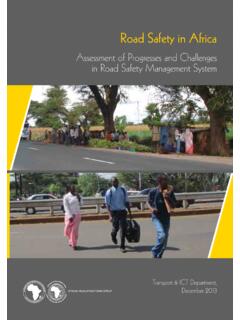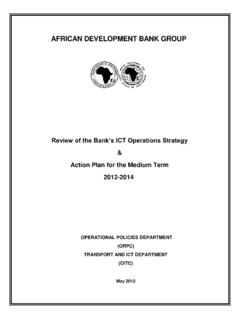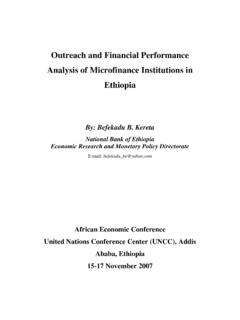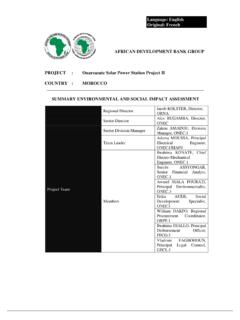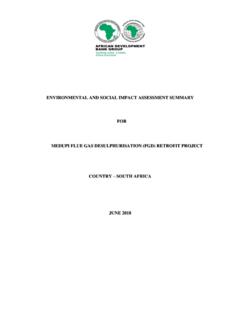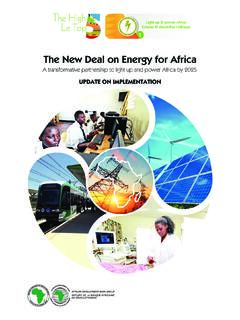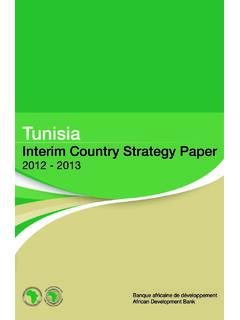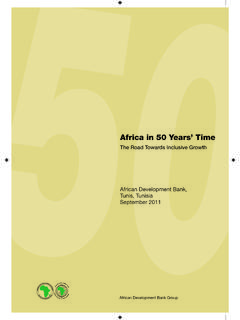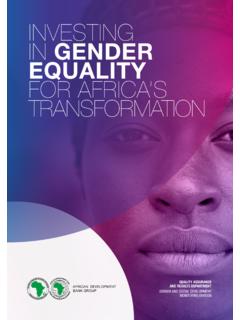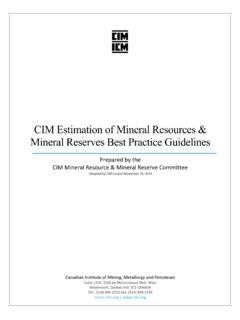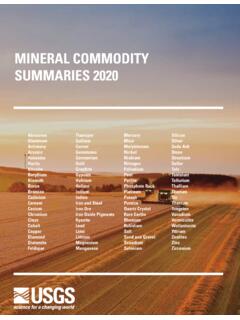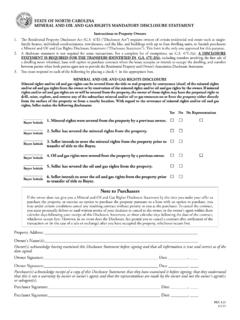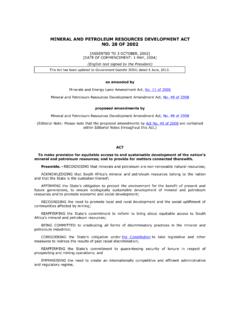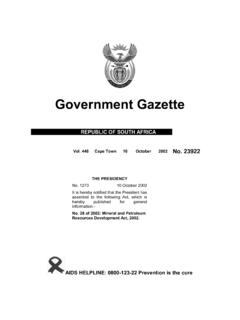Transcription of CHAPTER 4 Africa’s Natural Resources: The Paradox of Plenty
1 IntroductionAfrica is blessed with vast Natural resourcesand rich environments (see Chapters 2 and3). It is generously endowed with pro-ductive land and with valuable naturalresources, which include renewableresources (such as water, forestry, andfisheries) and non-renewable resources(minerals, coal, gas, and oil). Naturalresources dominate many nationaleconomies and are central to the livelihoodsof the poor rural majority. These resourcesare the basis of income and subsistence forlarge segments of Africa s population andconstitute a principal source of publicrevenue and national the right circumstances, a naturalresource boom can be an important catalystfor growth, development, and the transitionfrom cottage industry to factory.
2 With the right approach naturalresources can be used to make the transfor-mation from a low-value economy that relieson exports of primary commodities to onewith a substantial labor-intensive manu-facturing is commonly agreed that one of theavenues for getting many of the poorestAfrican countries out of the low-income trapis to provide them with a big demand pushthat will generate enough demandcomplementarities to expand the size ofmarkets and recover the fixed costs ofindustrialization.
3 Natural resource wealthcould be used to pursue this , in many African countriesnatural resource booms have only to alimited extent set off a dynamic growthprocess (see Box ). This is largely due tofailure to implement the right growth-promotion policies and to ensure that stronginstitutions are in place suggesting that itis very difficult to make the big pushtowards diversification and development ofmanufacturing in the resource -rich parts ofAfrica. The danger is that much of Africa isnot industrialized and is stagnating in astaple trap, dependent on exports of a fewmineral particular, oil resour -ces and other point resource -dependencycould, with the wrong policies, lead to failure of Natural resource wealth tolead to the expected economic growth anddevelopment has been attributed to severalfactors.
4 Including the so-called Dutch Disease thesyndrome of rising real exchangerates and wages driving out pre-existing export and import-competingindustries; rent-seeking by elites and others thatotherwise could put their energiesinto profit-making activities;1 See Auty (2001); Auty (2004); and Ploeg (2007)for detailed discussion of these aspectsCHAPTER 4 Africa s Natural Resources: The Paradox of Plenty (E) AfricanBank 2007 Ch4 11/10/07 13:54 Page 96 volatility of prices and the asymmetryof adjustment (it is easier to ramp uppublic expenditure than to wind itdown again); inflexibility in labor, product, andasset markets; and tensions between oil-producing andnon-oil producing regions is the resource Curse?
5 The resource curse refers to a situationwhereby a country has an export-drivennatural resources sector that generates largerevenues for government but leadsparadoxically to economic stagnation andpolitical is commonly used to describe the negative developmentoutcomes associated with non-renewableextractive resources (petroleum and otherminerals).3 Essentially, the resource curserefers to the inverse association betweendevelopment and Natural resourceabundance.
6 It has often been asserted thatpetroleum, in particular, brings trouble waste, corruption, consumption, debt over-hang, deterioration, falling apart of publicservices, wars, and other forms of conflicts,among others. Thus, Natural resource -abundant countries tend to grow slowerthan expected considering their resourcewealth and, in many cases, actually growslower than resource -scarce common thread in explaining theresource curse along with the other broadexplanations provided above is thecentral role of government behavior.
7 Thekey issue here is how governmentsadminister resource wealth and how theyuse Natural resource accounts indicate that naturalresource booms do not always worseneconomic performance, and can indeedcatalyze economic transformation. A resourceboom can lead to growth expansion, asdemonstrated in the case of Europe (indus-trialization), the new economies (Australia,Canada and the United States), and tropicalsubsistence agricultural economies withoutmanufacturing. Today, resource -rich coun-tries like the United Arab Emirates, Kuwait,and Qatar are using revenues from theirresource wealth to construct mega-cities outof desert land, thereby also generating con-siderable down- and side-stream economicactivities and additional incomes.
8 Thesecountries have also undertaken large-scaleforeign investments, which not only promoteeconomic development, but also foster inter-generational equity. The key point is that theoften referred to Natural resource curse canbe avoided with the right knowledge,institutions and QuestionsDrawing on an appropriate theoreticalframework, and on the logic presented inthe previous section, this CHAPTER examinesthe African evidenceof the Paradox ofplenty and the resource curse with a viewto exploring the following issues andquestions: Is Natural resource abundance inAfrica a curse or a blessing?
9 Has the management of naturalresources really stunted the growthAfrica s Natural Resources: The Paradox of Plenty 972 Overseas Development Institute (ODI) (2006)3 Catholic Relief Services (2003)(E) AfricanBank 2007 Ch4 11/10/07 13:54 Page 97and development prospects of manyresource-rich African economies? How does the volatility in the exportvalue of resources contribute tovolatility of growth in GDP per capitaand to growth and development ingeneral? What political and social factorsenable some resource -abundantcountries to utilize their naturalresources to promote develop-ment and prevent other resource -abundant countries from doing thesame?
10 How does access or non-access to thecoast (that is, being a landlockedcountry or not) affect developmentparameters?98 African Development Report 2007 Box : Cross-Country Evidence of the Natural resource CurseThere are, indeed, resource -rich countries that benefit from their Natural wealth, but overall, the economiesof many resource -rich countries are in a surprisingly poor state. History clearly shows that Natural resourcewealth may harm economic performance and make citizens worse off. There are well-known examples ofcountries whose abundant Natural resources have been accompanied by bad macroeconomic performanceand growing inequality among its citizens.
